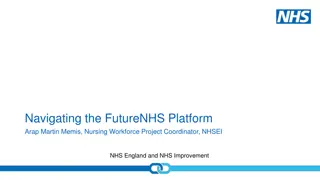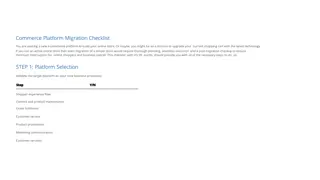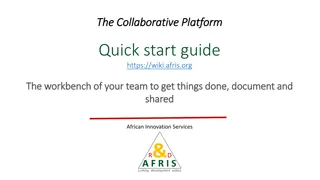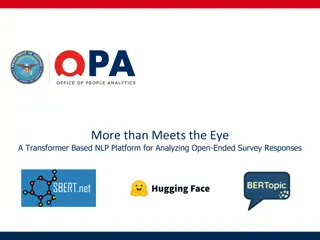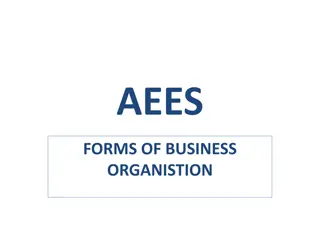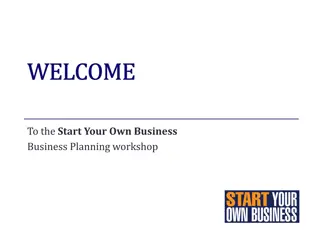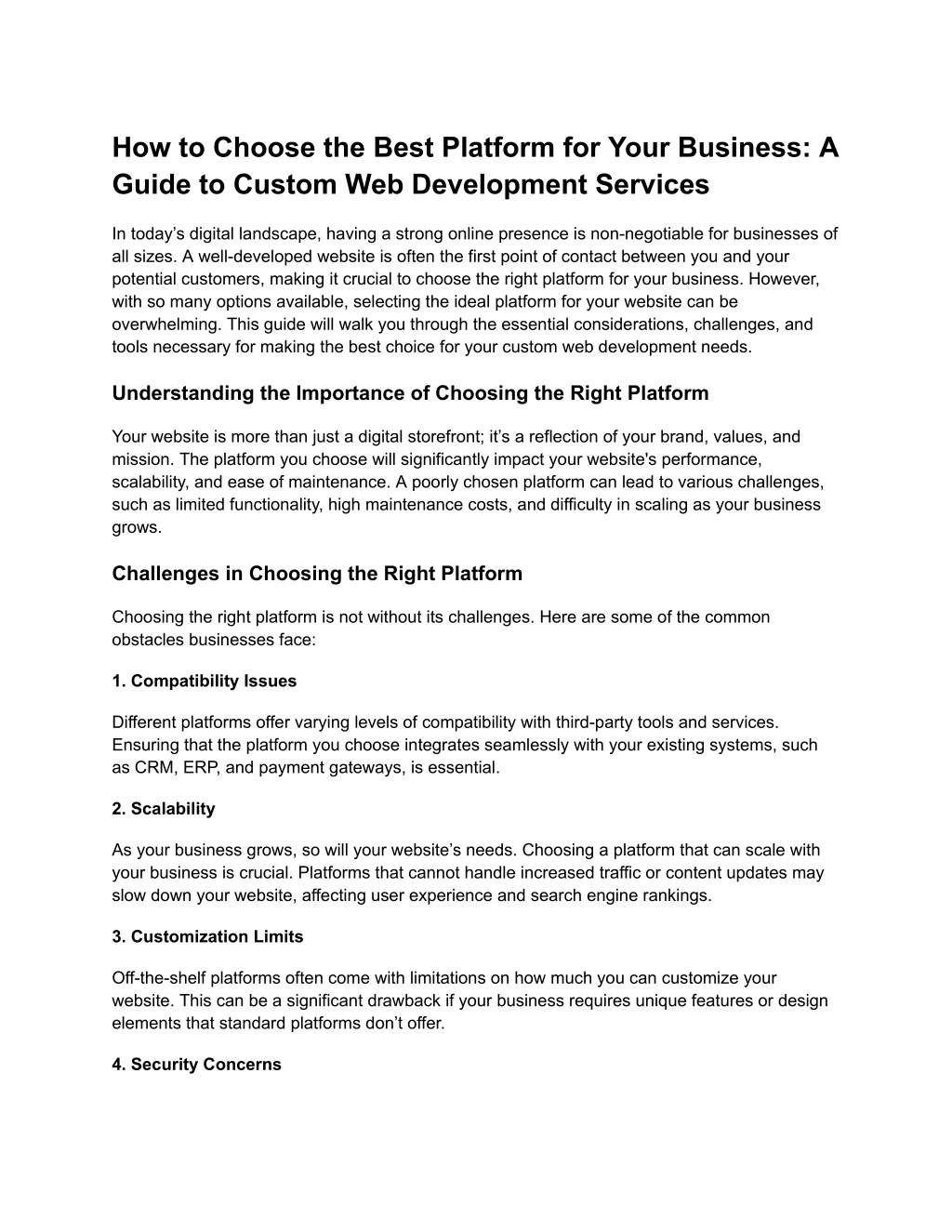
How to Choose Best Platform for Your Business
Struggling to find the right platform for your business website? In today's fast-paced digital world, choosing the right web development platform is crucial to your success. Our latest blog, How to Choose the Best Platform for Your Business: A Guide
Download Presentation

Please find below an Image/Link to download the presentation.
The content on the website is provided AS IS for your information and personal use only. It may not be sold, licensed, or shared on other websites without obtaining consent from the author. Download presentation by click this link. If you encounter any issues during the download, it is possible that the publisher has removed the file from their server.
E N D
Presentation Transcript
How to Choose the Best Platform for Your Business: A Guide to Custom Web Development Services In today s digital landscape, having a strong online presence is non-negotiable for businesses of all sizes. A well-developed website is often the first point of contact between you and your potential customers, making it crucial to choose the right platform for your business. However, with so many options available, selecting the ideal platform for your website can be overwhelming. This guide will walk you through the essential considerations, challenges, and tools necessary for making the best choice for your custom web development needs. Understanding the Importance of Choosing the Right Platform Your website is more than just a digital storefront; it s a reflection of your brand, values, and mission. The platform you choose will significantly impact your website's performance, scalability, and ease of maintenance. A poorly chosen platform can lead to various challenges, such as limited functionality, high maintenance costs, and difficulty in scaling as your business grows. Challenges in Choosing the Right Platform Choosing the right platform is not without its challenges. Here are some of the common obstacles businesses face: 1. Compatibility Issues Different platforms offer varying levels of compatibility with third-party tools and services. Ensuring that the platform you choose integrates seamlessly with your existing systems, such as CRM, ERP, and payment gateways, is essential. 2. Scalability As your business grows, so will your website s needs. Choosing a platform that can scale with your business is crucial. Platforms that cannot handle increased traffic or content updates may slow down your website, affecting user experience and search engine rankings. 3. Customization Limits Off-the-shelf platforms often come with limitations on how much you can customize your website. This can be a significant drawback if your business requires unique features or design elements that standard platforms don t offer. 4. Security Concerns
Security should be a top priority when choosing a platform. Some platforms are more vulnerable to attacks than others, making it essential to select one that offers robust security features, regular updates, and compliance with industry standards. 5. Cost Considerations While some platforms may appear cost-effective initially, they can become expensive in the long run due to hidden fees, licensing costs, and the need for additional plugins or customizations. Precautions to Take When Selecting a Platform To mitigate the challenges mentioned above, it s crucial to take specific precautions during the selection process: 1. Conduct Thorough Research Before settling on a platform, conduct in-depth research. Look into the platform s features, pricing, scalability, and customer reviews. Understanding the pros and cons will help you make an informed decision. 2. Consult with Experts Engaging with a professional web development services provider can offer valuable insights. Experts can guide you in choosing the best platform based on your business needs, budget, and long-term goals. 3. Test the Platform Most platforms offer a trial period or demo version. Take advantage of this to test the platform s features, user interface, and performance. This hands-on experience will give you a better understanding of whether the platform meets your requirements. 4. Prioritize Security Features Ensure that the platform you choose has built-in security features such as SSL certificates, regular updates, and compliance with data protection regulations like GDPR. Investing in a secure platform will protect your business from potential cyber threats. 5. Evaluate Support and Community A platform with robust customer support and an active community can be invaluable. Look for platforms that offer 24/7 customer support, detailed documentation, and an active user community that can provide assistance when needed. Tools to Aid in Platform Selection
Several tools and resources can help you choose the best platform for your business: 1. Content Management Systems (CMS) Content Management Systems like WordPress, Joomla, and Drupal are popular choices for businesses looking for flexibility and ease of use. These platforms offer a wide range of plugins and themes that can be customized to meet your business needs. 2. E-commerce Platforms For businesses focused on online sales, platforms like Shopify, WooCommerce, and Magento offer specialized features for managing products, payments, and customer relationships. 3. Website Builders For small businesses or startups with limited technical expertise, website builders like Wix, Squarespace, and Weebly provide drag-and-drop interfaces, making it easy to create a professional-looking website without coding knowledge. 4. Custom Web Development If your business has unique needs that cannot be met by standard platforms, consider investing in custom web development services. A custom-built website offers complete control over design, functionality, and scalability, ensuring that your site grows with your business. The Role of Custom Web Development Services While pre-built platforms and website builders can be convenient, they often fall short in delivering the level of customization and performance that growing businesses require. web application development services offer a tailored approach, ensuring that your website meets your specific needs and can adapt to future challenges. 1. Tailored Solutions Custom web development services allow you to build a website from the ground up, tailored to your business requirements. This level of customization is ideal for businesses with unique processes, complex product offerings, or specific user experience goals. 2. Enhanced Performance Custom websites are optimized for performance, ensuring faster load times, better SEO, and a superior user experience. A well-optimized website not only improves customer satisfaction but also boosts search engine rankings. 3. Future-Proofing
With custom development, your website is built with scalability in mind. As your business grows, your website can easily be updated or expanded to accommodate new features, products, or services. 4. Improved Security Custom-built websites are less vulnerable to security breaches as they are not dependent on third-party plugins or templates. A dedicated development team can implement advanced security measures tailored to your business, reducing the risk of cyber attacks. Choosing the Right Partner for Custom Web Development Selecting the right partner for your custom web development services is as important as choosing the right platform. Here are some tips to help you make the right choice: 1. Experience and Expertise Look for a company with a proven track record in delivering successful custom web development projects. A team with diverse expertise in various technologies and industries can offer innovative solutions that align with your business goals. 2. Communication and Collaboration A good development partner will prioritize clear communication and collaboration throughout the project. Regular updates, transparent processes, and a willingness to understand your business are essential qualities to look for. 3. Portfolio and References Review the company s portfolio to see examples of their previous work. Don t hesitate to ask for references from past clients to gauge their satisfaction with the services provided. 4. Post-Launch Support The work doesn t end once your website goes live. Choose a development partner that offers ongoing support, maintenance, and updates to ensure your website remains secure and up-to-date. Conclusion: Making the Right Choice for Your Business Choosing the right platform for your website is a critical decision that can impact your business s success. By understanding the challenges, taking the necessary precautions, and leveraging the right tools, you can select a platform that aligns with your business needs. For businesses that require a tailored approach, investing in custom web development services can provide the flexibility, performance, and security needed to thrive in today s competitive market.
Ready to build a website that grows with your business? Contact Consagous today for expert guidance and custom web development solutions that are designed to help you succeed.













